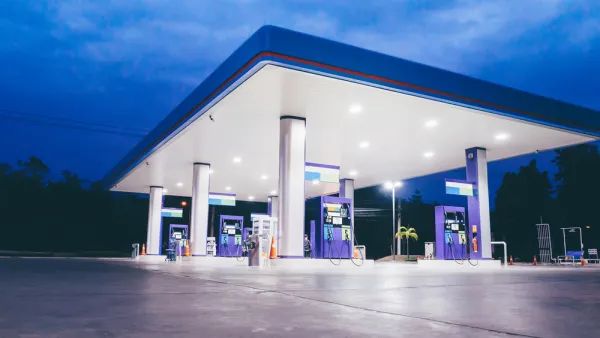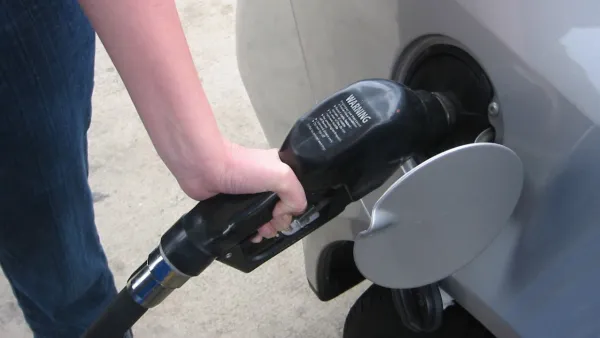With the two Democrat candidates debating who is the real progressive, it would be interesting to see how they would respond, if asked, about President Obama's proposed $10-per-barrel fee to fund a 21st Century Clean Transportation System.
On Tuesday, President Obama presents his 2017 budget to Congress. Among its more controversial items will be a phased $10-per-barrel oil fee over five years, to be paid by oil companies, to fund the 21st Century Clean Transportation System in addition to basic road and bridge infrastructure paid by the the Highway Trust Fund.
In his editorial blog, Vikas Bajaj, who covers business and international economics for The New York Times editorial board, writes that "the administration would use the $32 billion the tax would raise to invest in mass transit, high-speed rail and research into clean energy and self-driving cars."
Of course, the Republicans who control Congress — and who deny that human activity is causing climate change — are already denouncing the idea, as is the oil industry. That’s why it is unlikely to become law soon.
That's pretty much a given, though it will be interesting to see how some Republicans who have supported increasing the gas tax, such as Sen. Bob Corker (Tenn.) and Rep. Tom Rice (S.C.), react to the measure.
More important will be how former Secretary of State Hillary Clinton and Sen. Bernie Sanders, both vying for the Democratic nomination for president, react. The two have been debating who is the true "progressive."
Some background information from their campaigns and past campaigns
- Clinton has pledged not to raise taxes on the middle class, while Sanders has already indicated that such taxes would be necessary to implement his "Medicare for all" health plan.
Readers may recall that while Obama is now proposing what is essentially a gas tax in his last year in office, he has consistently opposed raising the gas tax, presumably because of his promise not to raise taxes on the middle class.
- In her 2008 presidential primary campaign against then Sen. Senator Obama (Ill.), Clinton supported a "gas tax holiday," first proposed by then Republican candidate Sen. John McCain (Az.), but opposed by candidate Obama.
Back to Bajaj's blog. He makes a good case as to why the oil fee can be viewed as progressive:
As the editorial board wrote recently [posted here], taxing sources of carbon emissions is an effective way to reduce the use of these polluting fuels and to generate revenue that can be used in a variety of ways, including reducing other taxes and investing in transportation and research. British Columbia (B.C.) has imposed a modest carbon tax since 2008 and has cut emissions without hurting its economy.
Regressive? Yes....but....
Bajaj adds:
There is no question the fee will increase the cost of gasoline, diesel and other fuels and products made from oil. That’s the point. But with oil trading at around $32 a barrel, this is an ideal time to start imposing a carbon tax. It would be easier for individuals and businesses to adjust to such a tax now than it would have been less than two years ago, when oil was at more than $100 a barrel.
Bajaj could have written more about the B.C. carbon tax, which can be viewed as progressive as it is used to reduce income taxes, as a 2012 post indicates:
"British Columbia has lowered its corporate income tax rate to 10 percent from 12 percent, a rate that is among the lowest in the Group of 8 wealthy nations. Personal income taxes for people earning less than $119,000 per year are now the lowest in Canada, and there are targeted rebates for low-income and rural households."
The above-cited editorial notes that the B.C. carbon tax is the highest in North America, comparing it to carbon cap-and-trade programs elsewhere. It classifies the carbon tax as revenue-neutral for the aforementioned reasons.
British Columbia, which is home to 4.7 million people, has placed the highest price on emissions in North America, taxing a ton of carbon emitted at 30 Canadian dollars, or about $21. By comparison, emission permits in California and Quebec are trading at about $13 a ton. And permits sold for $7.50 a ton in a December auction in the Northeastern trading system known as the Regional Greenhouse Gas Initiative. That system covers emissions from power plants in nine states that include Connecticut, New York and Massachusetts.
But if it's a foregone conclusion that Republican opposition will ensure that the oil barrel fee goes nowhere, why introduce it? Bajaj takes a positive outlook here. No one expected marriage equality to become the law of the land, or health care reform to pass, he opines. And polls show that "a majority of Americans believe climate change has already begun."
FULL STORY: It’s Time to Talk About Taxing Oil

National Parks Layoffs Will Cause Communities to Lose Billions
Thousands of essential park workers were laid off this week, just before the busy spring break season.

Retro-silient?: America’s First “Eco-burb,” The Woodlands Turns 50
A master-planned community north of Houston offers lessons on green infrastructure and resilient design, but falls short of its founder’s lofty affordability and walkability goals.

Delivering for America Plan Will Downgrade Mail Service in at Least 49.5 Percent of Zip Codes
Republican and Democrat lawmakers criticize the plan for its disproportionate negative impact on rural communities.

Test News Post 1
This is a summary

Test News Headline 46
Test for the image on the front page.

Balancing Bombs and Butterflies: How the National Guard Protects a Rare Species
The National Guard at Fort Indiantown Gap uses GIS technology and land management strategies to balance military training with conservation efforts, ensuring the survival of the rare eastern regal fritillary butterfly.
Urban Design for Planners 1: Software Tools
This six-course series explores essential urban design concepts using open source software and equips planners with the tools they need to participate fully in the urban design process.
Planning for Universal Design
Learn the tools for implementing Universal Design in planning regulations.
EMC Planning Group, Inc.
Planetizen
Planetizen
Mpact (formerly Rail~Volution)
Great Falls Development Authority, Inc.
HUDs Office of Policy Development and Research
NYU Wagner Graduate School of Public Service





























